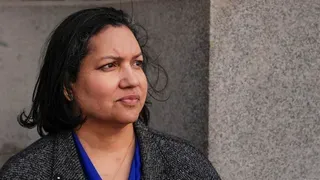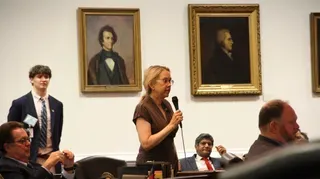March 2, 2009
Former NYC Mayor Ed Koch Still Running From 'Gay' Tag
Steve Weinstein READ TIME: 3 MIN.
When Ed Koch took over as mayor of New York City, the metropolis was on its knees. Bankrupt and in essentially in receivership to New York State, it had just weathered a blackout that came with unprecedented looting.
Koch, a Democratic congressman from ultra-liberal Greenwich Village, ran on a law-and-order platform that anticipated Mayor Rudolph Giuliani. His trademark "How'm I doin'"? became a catchphrase, He inaugurated the nation's first pooper-scooper law to fight dog waste, successfully fought the city's entrenched unions, and balanced the city's budget.
He also had a strong gay-rights record as mayor. One of his first initiatives was issuing an executive order prohibiting all anti-gay discrimination by city employees. This put the city in the forefront of such anti-discrimination laws and helped change the culture in city government.
He also signed into a law a long-delayed LGBT rights bill passed by the City Council. And he bequeathed an ancient public school in Greenwich Village to become the home of the LGBT Center, which has become a focal point of gay life in the city.
Koch, a lifelong bachelor, long fought rumors about his sexuality. He often was accompanied by a former Miss America, Bess Myerson, who had previously served as the city's first commissioner of consumer affairs. Koch made her his head of cultural affairs. Meyers would later flame out in a tabloid-ready affair with a man with a shady past and her involvement in an attempt to influence a judge through the judge's mentally unstable daughter.
When he ran for governor against Mario Cuomo in the Democratic Primary race of 1982, graffiti appeared in the city saying "vote for Cuomo not the homo."
The issue of Koch's sexuality came to a boiling point during the AIDS crisis. Randy Shilts, in his landmark history of the AIDS crisis, implied that Koch didn't fight for funding against the disease because of his perceived sexuality.
Activist and author Larry Kramer was much more pointed. In his play, "The Normal Heart," his hero repeatedly takes Koch to task for staying in the closet as an excuse not to fund the fledgling Gay Men's Health Crisis.
In real life, Kramer didn't mince words. The two men lived (and live) in the same building, and the doormen have reportedly been instructed to keep them in separate elevators.
When confronted with anti-gay bigotry during his gubernatorial run, Koch replied, "No, I am not a homosexual. If I were a homosexual, I would hope I would have the courage to say so. What's cruel is that you are forcing me to say I am not a homosexual. This means you are putting homosexuals down. I don't want to do that."
Later in life, he wrote, "What do I care? I'm 73 years old. I find it fascinating that people are interested in my sex life at age 73. It's rather complimentary! But as I say in my book, my answer to questions on this subject is simply 'Fuck off.' There have to be some private matters left."
And now: Koch still remains adamantly ... uncommitted. In a New York Times interview with city veteran reporter Sam Roberts, Koch had this answer to the long-asked question: "I do not want to add to the acceptability of asking every candidate, 'Are you straight or gay or lesbian?' and make it a legitimate question, so I don't submit to that question. I don't care if people think I'm gay because I don't answer it. I'm flattered that at 84 people are interested in my sex life--and, it's quite limited."
Roberts apparently failed to ask any follow-up questions, such as why asking a political candidate whether he were gay or straight is not a "legitimate question" now; or why it wouldn't be any more or less relevant than asking a candidate's religion or favorite ice cream flavor--or, for that matter, why at 84, he would still be so avid to dodge the question at all.
Steve Weinstein has been a regular correspondent for the International Herald Tribune, the Advocate, the Village Voice and Out. He has been covering the AIDS crisis since the early '80s, when he began his career. He is the author of "The Q Guide to Fire Island" (Alyson, 2007).







